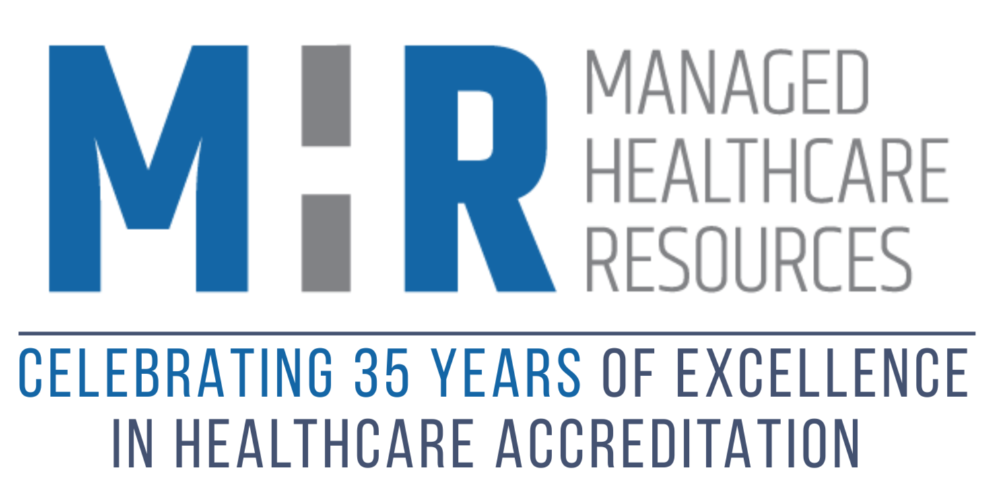
Estimated read time: 5 minutes
We've all been there—staring at committee minutes that look more like grocery lists than professional documentation. You know the ones: vague bullet points, mysterious abbreviations, and action items that somehow never seem to have owners. If this sounds familiar, you're not alone.
Here's the thing: those "quick notes" you scribble during meetings? They're not just internal housekeeping. They're official evidence that could make or break your NCQA accreditation.
At MHR, we've reviewed thousands of committee minutes over the years, and we can tell you this—weak minutes are one of the fastest ways to raise red flags during a survey. But when done right? They become your secret weapon. Here’s the rule of thumb: If anyone in the organization (or a consultant) can’t understand what was said, decided upon, and by whom, no surveyor will.
Why Committee Minutes Actually Matter (More Than You Think)
Let's be honest—nobody gets excited about taking meeting notes.
But here's what strong minutes can do for your organization:
✅ Safeguard your accreditation when surveyors come knocking
✅ Provide bulletproof evidence of discussions and decisions
✅ Drive real follow-up actions instead of letting things fall through the cracks
✅ Show NCQA you have a genuine culture of quality—not just good intentions
The bottom line? Minutes aren't just notes. They're official evidence that meaningful discussions took place and smart conclusions were drawn.
Where NCQA Actually Looks for Minutes (And What They're Hunting For)
NCQA surveyors don’t just glance at your minutes—they dissect them.
Here's where they're digging deep:
Utilization Management (UM)
Update coming in 2026: UM 1A, Factor 5 now requires committee oversight that goes beyond the basics.
Your minutes need to show:
- Annual evaluation of your UM program (not just that it happened, but what you concluded)
- Review of UM rates from UM 1 Elements B through E (and yes, those Critical Factors in B, C, and D matter)
- Which practitioners actually participated in reviewing those rates
- Concrete actions to address whatever you found
Here's where it gets interesting: UM 1F and UM 1G demand clear documentation of the UM rates, conclusions, opportunities, and prioritized actions. NCQA scores each product line you bring forward, so vague summaries won't cut it. UM 1H requires documentation of the implementation of recommended actions related to the UM program and UM rates.
Example: If your UM rates show high denial variability (and let's face it, they probably do), your minutes better show who discussed it, what conclusions you reached, what opportunities you identified, and—critically—who's accountable for fixing it.
Credentialing (CR)
Under CR 2A, NCQA surveyors will review three sets of your Credentialing Committee minutes from the look-back period. They're looking for proof that you actually reviewed credentials for practitioners who don't meet your criteria, and that files meeting criteria got proper physician or committee review.
Your minutes need to document every action: approvals, denials, corrective actions. Plus, they want to see participating practitioners and their specialties listed (though this can be on a separate document if that works better for your workflow).
Pro tip: We covered this in depth in our earlier blog on Credentialing Committees—worth a read if you missed it.
Quality Management & Improvement
QI 1D requires three sets of QI Committee minutes that show you're not just talking about quality—you're acting on it. NCQA wants to see review of QI program activities, needed actions, follow-up, policy decisions, and practitioner involvement.
Example that works: Minutes showing acceptance of the annual QI Evaluation and assignment of Dr. Jones to lead a new pediatric immunization push in rural areas where rates have lagged for three years. That's specific, actionable, and shows real engagement. (Of course, if you used SMART goals, you’d state how much you want to raise them and in what time period.)
Population Health Management
PHM 2C focuses on how you address member needs and healthcare disparities. Your minutes must document the annual review process—activities, resources, community support, discussions, participants, and any updates to population health programs based on the population assessment.
What good looks like: Committee minutes documenting review of your diabetes outreach program and the decision to expand services in urban areas after identifying critical gaps in Spanish-language education materials.
See how that tells a complete story?
How to Actually Record Minutes That Pass Scrutiny
Consistency wins the day here. A solid template with these elements helps ensure nothing slips through:
Committee basics: Identify the group, date, time (seems obvious, but you'd be surprised how often these get missed)
Attendees: List everyone, noting practitioners by network status, titles, specialties, and who's chairing. Don't forget to note who joined virtually or by phone—that matters for quorum.
Quorum check: Did you meet the threshold per your charter? Document it.
Agenda items: Tag those annual reports and key discussions. Prioritize what surveyors will want to see during the look-back period.
Discussion highlights: Summarize the main points—not every word, but enough to show real engagement.
Decisions and conclusions: State outcomes clearly. No ambiguity, especially around votes and approvals.
Follow-up actions: List specific tasks with actual deadlines.
Accountability: Assign responsibility to real people with real names.
Signatures and approval: Get those sign-offs documented.
Practical Tips That Actually Work
Here's what we've learned from years of helping clients get this right:
Assign a quality professional to each committee specifically to review minutes before they go anywhere near NCQA. Think of them as your quality control check.
Use NCQA's exact terminology. Don't say "yearly quality plan"—say "Annual QI Work Plan." These details matter more than you think and prevent questions.
Create a tracking log for recurring items like quarterly reports. It'll save you from frantically flipping through months of minutes trying to find something.
Carry action items forward until they're actually resolved. If something's important enough to assign, it's important enough to track.
Mark Credentialing Committee minutes confidential—this isn't optional.
Double-check AI transcription if you're using it. Technology is getting better, but it's not perfect, especially with medical terminology.
Attach minutes to your next meeting agenda for review and approval—create that feedback loop.
The Bottom Line
Strong committee minutes aren't bureaucratic busy work—they're accreditation insurance. They demonstrate that your organization takes compliance, accountability, and quality improvement seriously.
At MHR, our consultants have reviewed thousands of committee minutes over the years. We've seen what works, what doesn't, and what sends surveyors looking for problems.
Let us review your minutes before you submit to NCQA—it's much easier to fix issues on the front end than during a survey. And we clinicians learned this principle in school, “If you didn’t document it, you didn’t do it.” They need to stand on their own without anyone filling in the gaps with discussion.
Remember: Requirements for minutes vary by NCQA program. Always check the current year's standards at the NCQA Store.
Your Next Step
If your team is experiencing workforce changes (and frankly, who isn't these days?), it might be time to revisit the fundamentals. Our NCQA 101 training is designed as a comprehensive boot camp for anyone new to NCQA or needing a refresher.
During this training, our consultants walk through the essential aspects of standards, guidelines, appendices, the survey process, and yes—how to translate the NCQA lingo.
The training can be customized to your organization and is available for all staff at one set price. To schedule a session, visit MHR Trainings, fill out the purchase form, and submit. We'll contact you shortly to arrange the details. Or contact us at [email protected].
MHR ensures quality and accuracy in every resource we provide. This blog includes insights from MHR Clinical Consultant Sheila Petras, RN. Learn more about our independent consultants at managedhealthcareresources.com/consultants, and follow us on LinkedIn for updates.
Nancy Ross Bell, RN



